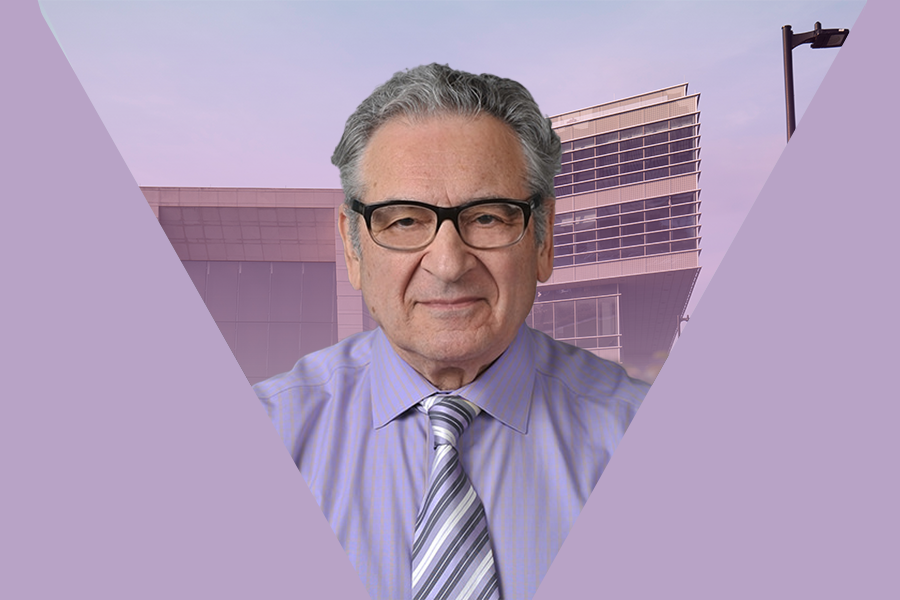Bienen Prof. Yampolsky instructs and inspires in 38 years of teaching and conducting at NU
Bienen Prof. Victor Yampolsky is set to retire after 38 years of teaching at NU.
October 19, 2021
Victor Yampolsky walked into Regenstein Hall of Music for his first rehearsal as Northwestern’s faculty director of Orchestras on Sept. 15, 1984.
Now, 37 years later, Yampolsky stands in the back of a room in that same building watching two of his students, Robert Hasty (Bienen ‘96) and Alexander Chen (Bienen ‘23), conduct this year’s chamber orchestra.
“What I said to (Hasty) 25 years ago, he still remembers everything I told him,” Yampolsky said of the associate director of orchestras as he watched Hasty conduct. “Amazing.”
This will be one of Yampolsky’s last quarters regularly entering the practice room. He’ll retire at the end of the school year after a rich 38-year career at NU.
Yampolsky came to the University over 30 years ago as faculty director of orchestras and received a professor title five years later. At the time, NU’s Bienen School of Music only had one orchestra. Yampolsky added two more undergraduate orchestras in the next three decades: a chamber orchestra for freshman and sophomore students and a separate orchestra for non-music majors.
After a run with the Moscow Philharmonic in Russia, Yampolsky immigrated to the U.S. in 1973. Teaching in a foreign language was difficult, he said, as he didn’t always have the words to express himself in the proper way to students.
“At the beginning I was frustrated because I did not have language,” he said. “And I wanted to explain a lot of things to students but I didn’t have words for it — the Russian was popping out.”
That language barrier didn’t seem to impede too much on the quality of his instruction, as alumni of Yampolsky’s masters in conducting program have gone on to create impressive resumes, and many conduct orchestras around the world. Former student Giancarlo Guerrero (Bienen ‘92) has received six Grammys.
Yampolsky said he emphasizes to students how much music can impact its listeners, and how much meaning it has beyond the notes written on the page.
Chen, a master’s student in conducting, first met Yampolsky at Carnegie Mellon University during his undergrad when Yampolsky came to the school to guest-conduct. After Chen approached Yampolsky to introduce himself, the professor shared advice about music, conducting and life for the next 20 minutes, Chen recalls.
“I didn’t even have to ask him. He just offered (advice) to me freely,” Chen said. “From then on I knew: not only does he really care about music, but he just is naturally a teacher.”
In classic Yampolsky humor, the conductor ended the conversation by telling Chen he would send him a bill for the session, though “of course he never did.”
Now, Chen is a first-year pursuing a master’s in conducting, which Yampolsky directs. The program only accepted six students in Chen’s year.
Though Chen said Yampolsky’s teaching method can be a bit daunting at first, he ultimately appreciates how much it has helped him grow.
“He sees abilities in other people that sometimes they themselves don’t see,” Chen said. “He pushes you to go out of your comfort zone, and then only afterwards, when you’ve accomplished these great things, you realize, ‘Wow, if it wasn’t for him, I would have never gotten to this point.’”
Hasty first met Yampolsky in 1994 when he attended NU for his master’s in conducting. He returned to the University in 2000 to pursue a doctorate and has been here ever since. Over the past 27 years, the relationship between the two has developed from student and teacher, to colleague, to the point where Hasty now calls Yampolsky “one of (his) best friends.”
One of Hasty’s favorite memories with Yampolsky came after Hasty’s brother passed away. Hasty took his family up to Door County, Wisconsin, to see his colleague conduct, and remembered the compassion Yampolsky showed for him and his family in the wake of the tragedy.
“You try to balance your personal and your professional life and try not to let it mix too much, but with him, you know, it was different,” Hasty said. “He’s not just a colleague, but he is one of my best friends, and I really wanted to be sure, at least until he retired, so that we could be a team until he was done.”
Hasty said he admires Yampolsky’s to-the-point teaching method, which he says is something he especially needed as a master’s student. Though he acknowledged the blunt approach can rub students the wrong way, he said Yampolsky’s sense of humor smoothes out the roughness.
Yampolsky plans to pull from conductors who shaped his own career for his final concert series. The conductor said he hopes the series will allow concert-goers a moment to step away from the chaos of today.
“Our country is being pulled apart, and many, many of us are angry, sometimes without knowing why, but it’s not what we are supposed to be,” Yampolsky said. “So, if there is an evening I could present to our public, where they would feel something is calming down for them, it could make them feel better.”
Yampolsky’s first concert of the fall season will take place at the Pick-Staiger Concert Hall on Oct. 23 at 7:30 p.m.
Ultimately, he said what he will miss most about Northwestern are his relationships with students.
“I teach (students) how to be phenomenal performers, but I teach them much deeper and wider. I teach them first of all that music in their life is nothing separate from their life,” Yampolsky said. “I like to tell them that what we learn here is not a job, nine to five.”
Email: [email protected]
Twitter: @AudreyHettleman
Related Stories:
— Q&A: Northwestern symphony conductor Victor Yampolsky
— Northwestern University Symphony Orchestra returns from 10-day Asia tour












